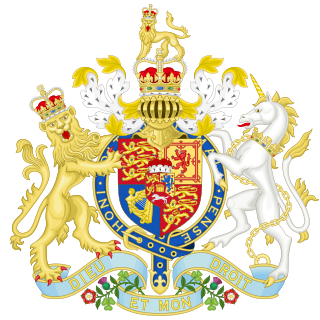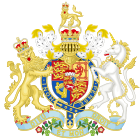
The Parliament of the United Kingdom of Great Britain and Northern Ireland is the supreme legislative body of the United Kingdom, and may also legislate for the Crown Dependencies and the British Overseas Territories. It meets at the Palace of Westminster in London. Parliament possesses legislative supremacy and thereby holds ultimate power over all other political bodies in the United Kingdom and the Overseas Territories. While Parliament is bicameral, it has three parts: the sovereign, the House of Lords, and the House of Commons. The three parts acting together to legislate may be described as the King-in-Parliament. The Crown normally acts on the advice of the prime minister, and the powers of the House of Lords are limited to only delaying legislation.
The Parliament Acts 1911 and 1949 are two Acts of the Parliament of the United Kingdom, which form part of the constitution of the United Kingdom. Section 2(2) of the Parliament Act 1949 provides that the two Acts are to be construed as one.

Whilst the House of Lords of the United Kingdom is the upper chamber of Parliament and has government ministers, for many centuries it had a judicial function. It functioned as a court of first instance for the trials of peers and for impeachments, and as a court of last resort in the United Kingdom and prior, the Kingdom of Great Britain and the Kingdom of England.

The Court of Appeal is the highest court within the Senior Courts of England and Wales, and second in the legal system of England and Wales only to the Supreme Court of the United Kingdom. The Court of Appeal was created in 1875, and today comprises 39 Lord Justices of Appeal and Lady Justices of Appeal.

The Court of Session is the highest national court of Scotland in civil cases. The court was established in 1532 to take on judicial functions previously exercised by the Scottish king and nobility. Its early jurisdiction overlapped with a number of other royal, state and church courts. As these were disbanded, the role of the Court of Session ascended. The acts establishing the United Kingdom provided that the Court of Session will "remain in all time coming". Today the court hears cases from any part of Scotland on any issue, other than criminal cases, which belong to its sister court, the High Court of Justiciary.

The High Court of Justiciary is the supreme criminal court in Scotland. The High Court is both a trial court and a court of appeal. As a trial court, the High Court sits on circuit at Parliament House or in the adjacent former Sheriff Court building in the Old Town in Edinburgh, or in dedicated buildings in Glasgow and Aberdeen. The High Court sometimes sits in various smaller towns in Scotland, where it uses the local sheriff court building. As an appeal court, the High Court sits only in Edinburgh. On one occasion the High Court of Justiciary sat outside Scotland, at Zeist in the Netherlands during the Pan Am Flight 103 bombing trial, as the Scottish Court in the Netherlands. At Zeist the High Court sat both as a trial court, and an appeal court for the initial appeal by Abdelbaset al-Megrahi.

Lords of Appeal in Ordinary, commonly known as Law Lords, were judges appointed under the Appellate Jurisdiction Act 1876 to the British House of Lords, as a committee of the House, effectively to exercise the judicial functions of the House of Lords, which included acting as the highest appellate court for most domestic matters.

The courts of Scotland are responsible for administration of justice in Scotland, under statutory, common law and equitable provisions within Scots law. The courts are presided over by the judiciary of Scotland, who are the various judicial office holders responsible for issuing judgments, ensuring fair trials, and deciding on sentencing. The Court of Session is the supreme civil court of Scotland, subject to appeals to the Supreme Court of the United Kingdom, and the High Court of Justiciary is the supreme criminal court, which is only subject to the authority of the Supreme Court of the United Kingdom on devolution issues and human rights compatibility issues.

The Supreme Court of the United Kingdom is the final court of appeal in the United Kingdom for all civil cases, and for criminal cases originating in England, Wales and Northern Ireland. As the United Kingdom's highest appellate court for these matters, it hears cases of the greatest public or constitutional importance affecting the whole population.

The Inner House is the senior part of the Court of Session, the supreme civil court in Scotland; the Outer House forms the junior part of the Court of Session. It is a court of appeal and a court of first instance. The chief justice is the Lord President, with their deputy being the Lord Justice Clerk, and judges of the Inner House are styled Senators of the College of Justice or Lords of Council and Session. Criminal appeals in Scotland are handled by the High Court of Justiciary sitting as the Court of Appeal.

The Court of Session Act 1810 was an Act of the Parliament of the United Kingdom reforming Scotland's highest court, the Court of Session. This Act was a follow-up Act to the Court of Session Act 1808 in reforming the Court of Session, creating the two divisions known as the Inner House and the Outer House.

The Court of Session Act 1813 was an Act of the Parliament of the United Kingdom which reformed Scotland's highest court, the Court of Session. The Act continued reforms to the Court of Session begun by the Court of Session Act 1808 and the Court of Session Act 1810, creating the divisions known as the Inner House and the Outer House.

The Criminal Lunatics Act 1800 was an Act of the Parliament of Great Britain that required and established a set procedure for the indefinite detention of mentally ill offenders. It was passed through the House of Commons in direct reaction to the trial of James Hadfield, who attempted to assassinate King George III.
Thoburn v Sunderland City Council is a UK constitutional and administrative law case, concerning the interaction of EU law and an Act of Parliament. It is important for its recognition of the supremacy of EU law and the basis for that recognition. Though the earlier Factortame had also referred to Parliament's voluntary acceptance of the supremacy of EU law, Thoburn put less stress on the jurisprudence of the ECJ and more on the domestic acceptance of such supremacy; Lord Justice Laws suggested there was a hierarchy of "constitutional statutes" that Parliament could only expressly repeal, and so were immune from implied repeal.

An Act of Parliament in the United Kingdom is primary legislation passed by the UK Parliament in Westminster, London.

The Interpretation Act 1889 was an act of the Parliament of the United Kingdom that consolidated enactments relating to statutory construction and provided definitions to shorten the language used in acts of Parliament.

An Act of Sederunt is secondary legislation made by the Court of Session, the supreme civil court of Scotland, to regulate the proceedings of Scottish courts and tribunals hearing civil matters. Originally made under an Act of the Parliament of Scotland of 1532, the modern power to make Acts of Sederunt is largely derived from the Courts Reform (Scotland) Act 2014. Since 2013, draft Acts have also been prepared by the Scottish Civil Justice Council and submitted to the Court of Session for approval.

The Criminal Justice Act 1948 is an Act of the Parliament of the United Kingdom. It implemented several widespread reforms of the English criminal justice system, mainly abolishing penal servitude, corporal punishment, and the right of peers to be tried for treason and felony in the House of Lords. The act also dealt with more minor aspects of criminal law, such as the procedure regarding bail. Early versions of the bill attempted to abolish the death penalty, but this would not occur until 1965.

The judiciary of Scotland are the judicial office holders who sit in the courts of Scotland and make decisions in both civil and criminal cases. Judges make sure that cases and verdicts are within the parameters set by Scots law, and they must hand down appropriate judgments and sentences. Judicial independence is guaranteed in law, with a legal duty on Scottish Ministers, the Lord Advocate and the Members of the Scottish Parliament to uphold judicial independence, and barring them from influencing the judges through any form of special access.

The Administration of Justice (Scotland) Act 1933 is an act of the Parliament at Westminster legislating for Scotland which introduced changes in Scottish legal procedure "following the recommendations of a Royal Commission which reported in 1927".













